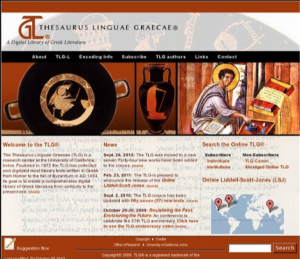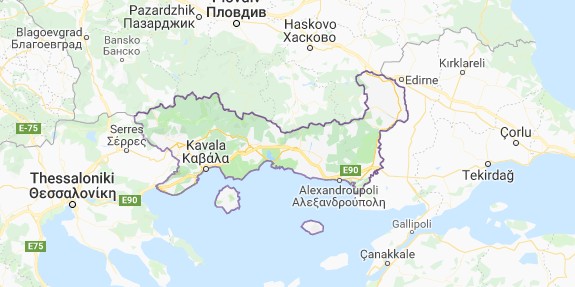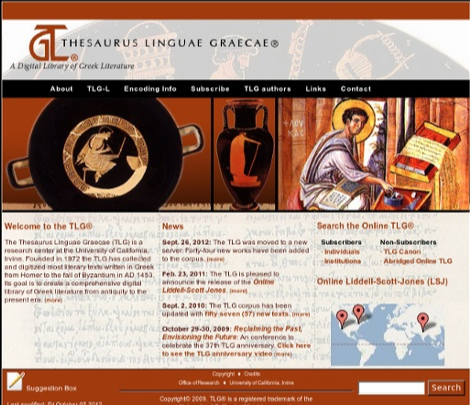 The Thesaurus Linguae Graecae (TLG®) is a research center at the University of California, Irvine. Founded in 1972 the TLG has already collected and digitized most literary texts written in Greek from Homer to the fall of Byzantium in AD 1453. Its goal is to create a comprehensive digital library of Greek literature from antiquity to the present era. Since 1985, the TLG® Digital Library has been disseminated in CD ROM format. The most recent edition was released in February 2000 with 76 million words of text. In April 2001, the TLG® became available Online to subscribing institutions and individuals. The web version currently provides access to 3,700 authors and 12,000 works, approximately 91 million words. It is updated quarterly with new authors and works. Information about the authors and works included in the TLG Library is stored in a database, known as the Canon of Greek Authors and Works. Non-subscribers can access an abridged/trial version of the TLG® corpus. The abridged/trial version has search capabilities as browsing and searching with a representative selection of texts.
The Thesaurus Linguae Graecae (TLG®) is a research center at the University of California, Irvine. Founded in 1972 the TLG has already collected and digitized most literary texts written in Greek from Homer to the fall of Byzantium in AD 1453. Its goal is to create a comprehensive digital library of Greek literature from antiquity to the present era. Since 1985, the TLG® Digital Library has been disseminated in CD ROM format. The most recent edition was released in February 2000 with 76 million words of text. In April 2001, the TLG® became available Online to subscribing institutions and individuals. The web version currently provides access to 3,700 authors and 12,000 works, approximately 91 million words. It is updated quarterly with new authors and works. Information about the authors and works included in the TLG Library is stored in a database, known as the Canon of Greek Authors and Works. Non-subscribers can access an abridged/trial version of the TLG® corpus. The abridged/trial version has search capabilities as browsing and searching with a representative selection of texts.The attributes of the Greek language prompted University of Irvine California to undertake this huge program in order to be able to use the Greek language’s wealth. A huge database has been constructed, consisting of 90 million verbal types of the Greek language. In comparison the English language has in total 490.000 words and 300.000 technical terms. This is hardly 1% of the Greek language. The professors in charge of the program estimate that the Greek words will surpass 90 million, against 9 millions words of the Latin. The interest for Greek resulted from the ascertainment of scientists of information technology and computers that the advanced computers of the future will accept as a “meaningful” language only Greek. All the other languages are characterized as “manufactured”.
“Meaningful” language is considered the language in were the word and its meaning that is what the word expresses, a thing, an idea or a situation they have between them primary relation. While a “manufactured” language is a language in which the word is arbitrarily fixed that it means the meaning. In other words, the Greek language is the only language in which the words have “primogeniture” (primary birth), while in the other languages the words are conventional; meaning something simply because thus was agreed between those that use it.
E.g. Enthusiasm in Greek means Excitement. Enthusiasm equals “en” – “Theos” – “ousia”. “En” means inside, “Theos” means God, “ousia” means substance. So altogether enthusiasm means in the substance of god.
Geometry, “geo” means ground, “metria” means I measure, so I measure the ground.
Atomo which is atom, “a” means not and “tomi” is the cut, so atomo is a thing that you can not cut it , or divide it. Ancient Greeks believed that atoms were the smallest particles.
We have causal relation between words and meanings. This happens because the Greek language has mathematic structure that allows a harmonious geometrical depiction. Particularly useful Greek words are: tele, land, geo, nano, micro, mega, scope, electro, circle, phone, macro, disc, graph, gram, syn, sym. Computers consider Greek language “not marginal”, that means that in this language limits are not existent and for this reason it is necessary for the advancement of the modern sciences like information technology, electronics, etc., where they will find the intellectual expressions needed, without which the scientific thought is unable to advance.




















